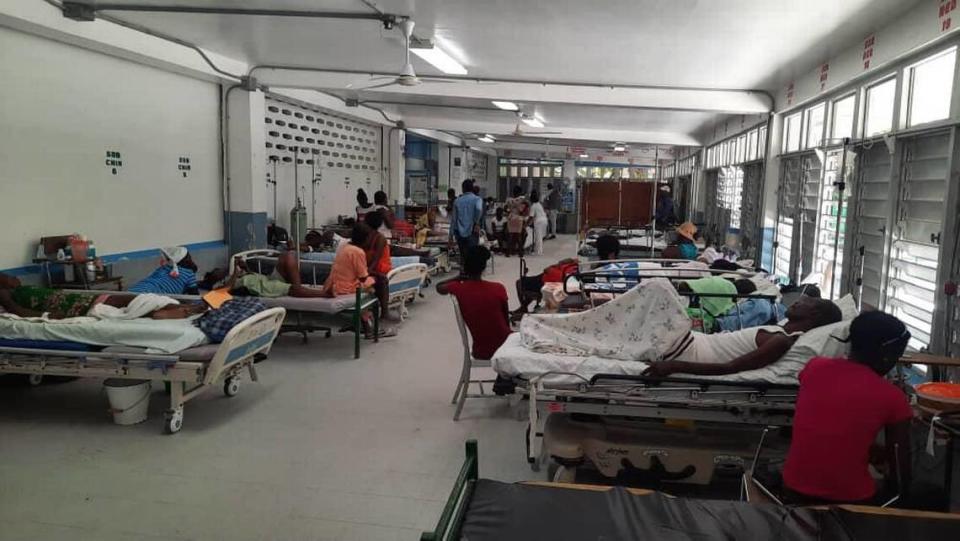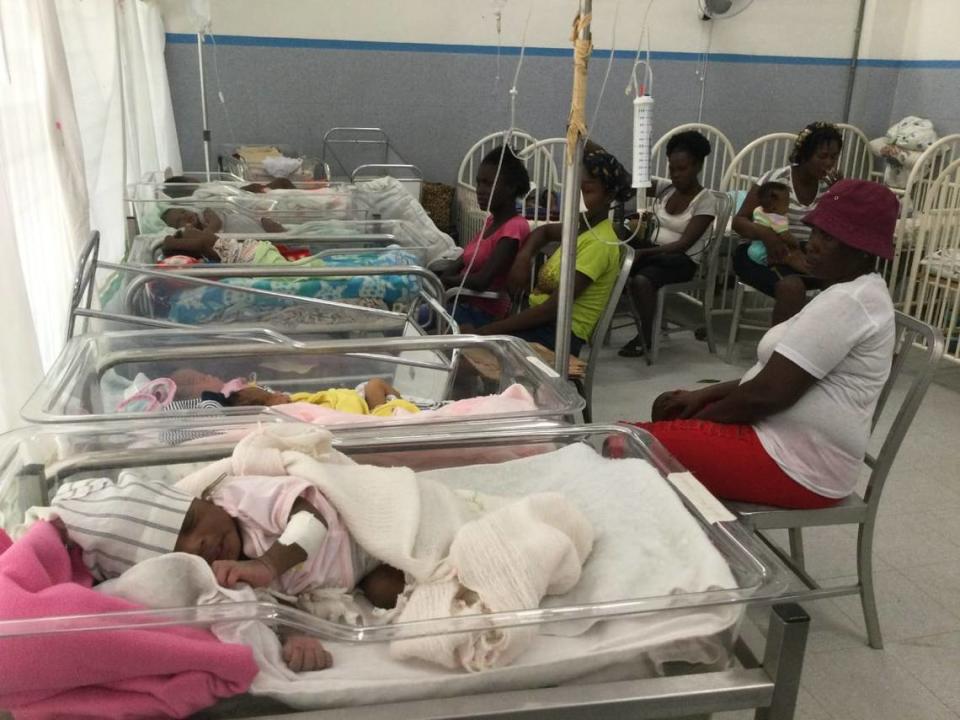Why a CNN journalist, a renowned chef and a Palm Beach resident are teaming up for Haiti
It was 2019 and Hôpital Albert Schweitzer, the only medical option available to hundreds of thousands of people along Haiti’s rural Artibonite River Valley, had just converted to solar power, expanded its 24-hour operations and implemented a surveillance program for mosquito-borne diseases and family planning.
All of it was costly. After years of being self-funded thanks to the efforts of its founders six decades earlier, the hospital, which sits on a 120-acre campus with its own solar power and water treatment plants, was in the red and cash reserves were running out.
“The hospital was facing a huge challenge,” recalls Jean Marc de Matteis, 50. “It was transitioning from the era of being self-funded ... and the board was facing tough decisions.”
On the table: scaling back medical services or closing altogether. Then de Matteis, whose wife, Verena, sat on the board, raised his hand. The Haitian-born professional thought that perhaps with his 20 years of experience in healthcare and commercial enterprises he could engineer a turnaround as the hospital’s next chief executive officer.
This was before widespread fuel shortages spurred a countrywide shutdown in July, blocking de Matteis and outsiders from accessing the hospital; before 2020’s COVID-19 pandemic made travel and in-person meetings almost impossible, and the world’s attention turned to finding personal protective equipment for local health facilities. And it was before Haiti’s deepening political turmoil took a spiraling downturn.
“Throw in a presidential assassination and then the earthquake,” de Matteis said. “And then of course now this situation, which is worse than everything combined — what we are going through in Haiti now.”

Despite the challenges, de Matteis managed to keep Hôpital Albert Schweitzer afloat and open — even though last month armed gangs forced him to suspend regular operations and implement an emergency plan where the hospital only accepts life-threatening emergencies.
“I was able to go in there and get some efficient management going and reduce our expenses considerably and almost double our impact,” said de Matteis, who replaced former CEO Louis Martin in June 2019. “We’ve expanded our community health programs, we reestablished our mobile clinics and established an HIV clinic, which we did not have before. So I am really proud.”
More recent efforts included vaccinating 20,000-plus people against COVID-19, producing 20 million-plus liters of oxygen and spearheading relief efforts in the south of Haiti after a magnitude 7.2 earthquake struck the cities of Les Cayes and Jeremie in August 2021. In addition to bringing in World Central Kitchen and its founder, chef José Andrés, to provide thousands of hot meals to quake survivors, de Matteis and the hospital coordinated with Haiti Air Ambulance, which was part of a triage at the airport.
“We’re stepping in and serving where we see a void,” he said.
De Matteis’ leadership will be lauded Friday at the Sailfish Club of Florida in Palm Beach. A fundraiser for the hospital, the White Hot Night annual benefit is spearheaded by Palm Beach resident Louise Stephaich, whose uncle and aunt, Larry and Gwen Mellon, founded Hôpital Albert Schweitzer in Deschapelles, Haiti, 67 years ago.
Stephaich, 93, who once traveled to Haiti amid food riots to go check on the care being given, said the benefit isn’t just about raising funds for the hospital in a time of need. It is also about bringing desperately needed attention to Haiti, where medical facilities and professionals are increasingly becoming casualties in the escalating armed gang violence.
“I want people to be aware of what’s going on in Haiti,” she said. “Hopefully they will talk to people in Washington. With Ukraine going on, we don’t see that much about Haiti.”
Hospital operating under ‘war-like conditions’
Despite scaling back regular operations, the hospital has remained busy. The pediatric ward is full, and surgeries are ongoing, de Matteis said, taking place “under war-like conditions.”
“We’ve treated more gunshot victims in three weeks than we did for all of last year,” he said.
So far, supplies are still coming in, though every day is a game of chance and tactical maneuvering to get supplies, first out of the port, and then onto the road through gang-controlled roads unnoticed.
“There is no food getting out anywhere,” said de Matteis, deeply worried about the Artibonite, the country’s breadbasket. “All of the solutions that are being proposed, $100 million for this and that, 14 months ago that would have had a chance, but today, there is nothing to reinforce.”
The co-chairs of Friday’s fundraiser are CNN’s Anderson Cooper and author Mitch Albom, along with Andrés, as well as Stephaich and Verena de Matteis. Albom, a journalist and philanthropist who runs an orphanage in Haiti and still travels there regularly, said he knows firsthand the stress under which hospitals are operating.
Over the last six weeks, staff had to run all over Port-au-Prince on a Sunday looking for medication to stop a seizure after a hospital didn’t have it to treat one of his kids. Another facility discharged another one of his kids despite him being diagnosed with tuberculosis because the hospital said it had to shut down due to the gang violence preventing staff from getting to work.
“I think it’s hard for any American mind that hasn’t been to Haiti to really comprehend what’s gong on there in hospitals or anything else for that matter. It’s just so far out of our realm of thinking,” he said. “It’s the worst thing you can imagine and then another 10% beyond that. When it comes to hospitals, what more vital cog of society can there be? You would think maybe the gangs would leave them alone. It’s just not true.”
People are being forced to take their safety into their own hands, said Albom, in order to get to and from work and just to save someone’s life.
Schweitzer inspired Haiti’s hospital
Stephaich’s uncle, Larry Mellon, was a rancher when someone dropped a copy of a magazine at his doorstep one day. On the cover was a photo of Dr. Albert Schweitzer, the Nobel Peace Prize laureate and medical missionary whose humanitarian work included building a hospital in Africa.
Mellon and Schweitzer corresponded, and the latter inspired him to quit ranching and become a doctor, even though Mellon at the time only had one year of undergraduate studies, Stephaich recalled.
Eventually, Mellon and his wife, Gwen, who had wanted to be a missionary, settled on Haiti after traveling the hemisphere looking for a place to build their own hospital. In Deschapelles, they found the campus of a defunct fruit company, which had a lot of buildings, and were given the land by the government on the condition that they make it a hospital.

During his time at the hospital, which he named in honor of his friend and inspiration, Larry Mellon was known for walking around with a pith helmet, hence the name Le Grand Chapeau Award for Philanthropy and Service that de Matteis will receive.

Like Stephaich, de Matteis wants to keep Friday’s focus on Haiti and the professionals providing day-to-day care. People like Dr. Jean William “Bill” Pape, who runs the Gheskio medical clinics, and University Hospital of Mirebalais’ Loune Viard and Didi Bertrand Farmer, widow of the late Dr. Paul Farmer, who also focused on bringing healthcare to central Haiti.
“The worse the humanitarian crisis gets the more hospitals and our services are needed,” de Matteis said. “Whatever the situation is in Haiti ... the 2,800 women with high risk pregnancies that give birth every year and the 800 Caesarean sections that we do every year are needed more than even when people are suffering more.
“At the end of the day, we are alleviating suffering,” de Matteis added. “And that’s always a positive thing.”
To donate to the hospital, a nonprofit tax-exempt charitable organization, make checks payable to HAS Haiti, P.O. Box 110091, Pittsburgh, PA 15232, USA; or by phone 1-412-351-5200. You can also go to https://hashaiti.org/take-action/ways-to-give/donate/

